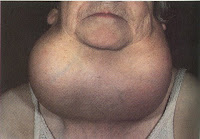What is the Thyroid?
The thyroid is a small gland, shaped like a butterfly, located in the lower part of your neck. The function of a gland is to secrete hormones. The main hormones released by the thyroid are triiodothyronine, abbreviated as T3, and thyroxine, abbreviated as T4. These thyroid hormones deliver energy to cells of the body.
The most common problems that develop in the thyroid include:
*Hypothyroidism -- An underactive thyroid.
*Hyperthyroidism -- An overactive thyroid.
*Goiter -- An enlarged thyroid.
*Thyroid Nodules -- Lumps in the thyroid gland.
*Thyroid Cancer -- Malignant thyroid nodules or tissue.
*Thyroiditis -- Inflammation of the thyroid.
Hypothyroidism
When the thyroid gland is underactive, improperly formed at birth, surgically removed all or in part, or becomes incapable of producing enough thyroid hormone, a person is said to be hypothyroid. One of the most common causes of hypothyroidism is the autoimmune disease called Hashimoto's disease, in which antibodies gradually target the thyroid and destroy its ability to produce thyroid hormone.
Symptoms of hypothyroidism usually go along with a slowdown in metabolism, and can include fatigue, weight gain, and depression, among others.
For more info about hypothyroidsm,
Hyperthyroidism
When the thyroid gland becomes overactive and produces too much thyroid hormone, a person is said to be hyperthyroid. The most common cause of hyperthyroidism is the autoimmune condition known as Graves' disease, where antibodies target the gland and cause it to speed up hormone production.
You may have hyperthyroidism if you:
*Feel nervous, moody, weak, or tired.
*Have hand tremors, or have a fast or irregular heartbeat, or have trouble breathing even when *you are resting.
*Sweat a lot, and have warm, red skin that may be itchy.
*Have frequent and sometimes loose bowel movements.
*Have fine, soft hair that is falling out.
*Lose weight even though you are eating normally or more than usual.
Also, some women have irregular menstrual cycles or stop having periods altogether. And some men may develop enlarged breasts.
For further information on Hyperthyroid,
Autoimmune Thyroid Disease
Most thyroid dysfunction such as hypothyroidism or hyperthyroidism is due to autoimmune thyroid disease. Autoimmune disease refers to a condition where the body's natural ability to differentiate between its tissues, organs and glands, vs. outside bacteria, viruses or pathogens, becomes disrupted. This causes the immune system to wrongly mount an attack on the affected area, by producing antibodies. In the case of autoimmune thyroid disease, antibodies either gradually destroy the thyroid, or make it overactive.
Graves disease ()and Hashimoto thyroiditis () are forms of autoimmune thyroid disease. In these diseases, thyroid-reactive T cells are formed that infiltrate the thyroid gland.
Goiter/Thyroid Nodules
Sometimes the thyroid becomes enlarged -- due to Hashimoto's disease, Graves' disease, nutritional deficiencies, or other thyroid imbalances. When the thyroid become enlarged, this is known as a goiter.
Some people develop solid or liquid filled cysts, lumps, bumps and tumors -- both benign and cancerous -- in the thyroid gland. These are known as thyroid nodules.
Thyroid Cancer
A small percentage of thyroid nodules are cancerous. While thyroid cancer is a rare cancer, it's on the rise.
Thyroiditis
When the thyroid becomes inflamed, due to bacterial or viral illness, this is known as thyroiditis. Dr. Stephen Langer has discussed thyroiditis here at the site. It's also important to be aware of the development of some successful thyroiditis treatments.





There are many natural thyroid supplement treatments available today. These are much better option, because our body will respond better to natural thyroid supplements .
ReplyDeletereally ? thanks for the information andrea :)
ReplyDelete